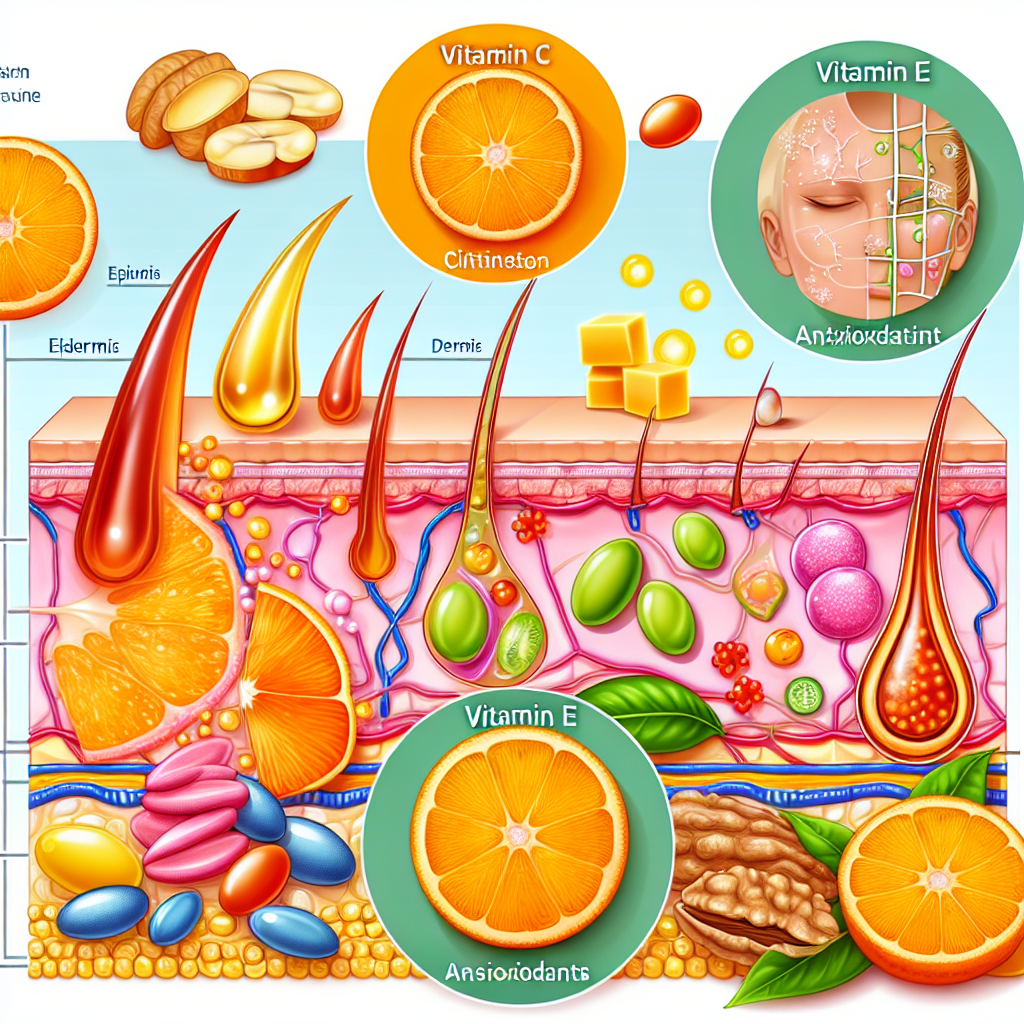How Vitamin C and E Keep Your Skin Glowing

Discover the secret to glowing skin with Vitamins C and E! Learn how these essential nutrients can enhance your skin’s health and give you that radiant glow you’ve always wanted. Don’t wait, start your journey to vibrant skin today. Click here to find out more.
The Role of Vitamin C and E in Achieving Radiant Skin
The quest for radiant, glowing skin is a journey that many embark on, but few truly understand. While there are countless skincare products and treatments available in the market, the secret to achieving that coveted glow may lie in something as simple as the vitamins we consume. Specifically, vitamins C and E have been found to play a crucial role in maintaining skin health and promoting a radiant complexion.
Vitamin C, also known as ascorbic acid, is a potent antioxidant that is essential for the growth, development, and repair of all body tissues. It is involved in numerous body functions, including the formation of collagen, absorption of iron, proper functioning of the immune system, wound healing, and maintenance of cartilage, bones, and teeth. When it comes to skin health, vitamin C is a superstar. It aids in the skin’s natural regeneration process, which helps the body repair damaged skin cells.
Moreover, vitamin C has been shown to neutralize free radicals, unstable molecules that can damage the cells in your body. This is particularly important for your skin, as free radical damage can lead to premature aging, including wrinkles and age spots. By neutralizing these harmful molecules, vitamin C can help to prevent or even reverse some of the signs of aging, leading to a more youthful and radiant complexion.
In addition to its antioxidant properties, vitamin C also plays a crucial role in collagen synthesis. Collagen is a protein that gives our skin its structure, firmness, and elasticity. As we age, our bodies naturally produce less collagen, leading to sagging skin and the formation of wrinkles. However, by boosting collagen production, vitamin C can help to maintain the skin’s elasticity and prevent the signs of aging.
On the other hand, vitamin E is another powerful antioxidant that can benefit the skin. It is fat-soluble, meaning it can be stored in the body’s fatty tissue and used as needed. Vitamin E helps to protect the skin from environmental damage, including from the sun’s harmful UV rays. It does this by absorbing the UV light and preventing it from causing damage to the skin cells. This can help to prevent the signs of premature aging, such as wrinkles and fine lines, and can also reduce the risk of skin cancer.
Furthermore, vitamin E has been found to be effective in reducing inflammation in the skin. This can be particularly beneficial for those with inflammatory skin conditions, such as eczema or psoriasis. By reducing inflammation, vitamin E can help to soothe the skin and improve its overall appearance.
In conclusion, vitamins C and E play a crucial role in maintaining skin health and promoting a radiant complexion. They do this through their antioxidant properties, which help to protect the skin from environmental damage, and their role in collagen synthesis, which helps to maintain the skin’s elasticity and prevent the signs of aging. So, if you’re on a quest for glowing skin, don’t overlook the importance of these essential vitamins. Incorporate them into your diet and skincare routine, and you’ll be well on your way to achieving that coveted glow.
Unlocking the Secrets of Glowing Skin: The Power of Vitamins C and E

Unlocking the secrets of glowing skin is a quest that has been pursued by many for centuries. In recent years, the spotlight has been cast on the power of vitamins, particularly Vitamin C and E, in maintaining and enhancing skin health. These vitamins, often found in skincare products, are touted for their ability to keep your skin glowing. But how exactly do they work? Let’s delve into the science behind these skin-loving vitamins.
Vitamin C, also known as ascorbic acid, is a potent antioxidant that plays a crucial role in the health of your skin. It is water-soluble, meaning it dissolves in water and is not stored in the body, making daily intake essential. One of its primary functions is to aid in the production of collagen, a protein that gives your skin its firmness and strength. As we age, our collagen production naturally decreases, leading to wrinkles and sagging skin. By boosting collagen production, Vitamin C helps to maintain skin elasticity, reducing the appearance of these aging signs.
Moreover, Vitamin C is renowned for its ability to combat the damaging effects of free radicals. These unstable molecules, produced by environmental stressors like pollution and UV radiation, can cause oxidative stress, leading to premature skin aging. Vitamin C neutralizes these harmful free radicals, preventing them from causing damage to your skin cells. This protective action helps to maintain the youthful appearance of your skin, keeping it glowing and vibrant.
On the other hand, Vitamin E, a fat-soluble vitamin, is also a powerful antioxidant that protects your skin from oxidative damage. It is particularly effective in protecting the skin from UV damage. When your skin is exposed to the sun, it produces free radicals that can damage the skin cells. Vitamin E absorbs these harmful UV rays, reducing their damaging effects and preventing signs of premature aging like wrinkles and dark spots.
In addition, Vitamin E has moisturizing properties that help to keep your skin hydrated. It strengthens the skin’s barrier function, reducing water loss and keeping your skin moisturized. This hydration helps to maintain the plumpness of your skin, giving it a healthy, youthful glow.
Interestingly, Vitamins C and E work synergistically to enhance each other’s effects. When used together, they provide a powerful defense against environmental damage. Vitamin C regenerates Vitamin E, enhancing its antioxidant power, while Vitamin E increases the effectiveness of Vitamin C by stabilizing it and extending its function.
In conclusion, the power of Vitamins C and E in maintaining and enhancing skin health cannot be overstated. They play a crucial role in collagen production, protect against environmental damage, and keep your skin moisturized, all of which contribute to a healthy, glowing complexion. Incorporating these vitamins into your skincare routine, either through topical application or dietary intake, can go a long way in unlocking the secret to glowing skin. However, it’s important to remember that while these vitamins are beneficial, they are not a magic cure-all. A balanced diet, adequate hydration, and a good skincare routine are also essential for maintaining healthy, glowing skin.
How Vitamins C and E Contribute to a Healthy, Glowing Complexion
Vitamin C and E are two essential nutrients that play a significant role in maintaining a healthy, glowing complexion. These vitamins are potent antioxidants that protect the skin from harmful free radicals, promote collagen production, and help to repair damaged skin cells.
Vitamin C, also known as ascorbic acid, is a water-soluble vitamin that is crucial for the synthesis of collagen, a protein that provides structure and elasticity to the skin. As we age, our skin’s natural collagen production decreases, leading to the formation of wrinkles and fine lines. By promoting collagen synthesis, vitamin C helps to maintain the skin’s firmness and elasticity, thereby reducing the appearance of these aging signs.
Moreover, vitamin C is a powerful antioxidant that protects the skin from the damaging effects of free radicals. Free radicals are unstable molecules that can cause oxidative stress, leading to premature skin aging and various skin disorders. By neutralizing these harmful molecules, vitamin C helps to prevent skin damage and maintain a youthful, glowing complexion.
In addition to its antioxidant properties, vitamin C also plays a crucial role in skin brightening. It inhibits the enzyme tyrosinase, which is responsible for the production of melanin, the pigment that gives color to our skin. By reducing melanin production, vitamin C helps to lighten hyperpigmentation and dark spots, resulting in a more even skin tone.
On the other hand, vitamin E, also known as tocopherol, is a fat-soluble vitamin that is renowned for its potent antioxidant and moisturizing properties. Like vitamin C, vitamin E protects the skin from the damaging effects of free radicals. However, it also has the unique ability to absorb the harmful ultraviolet (UV) rays from the sun, making it an essential ingredient in sunscreens.
Vitamin E is also a natural anti-inflammatory agent. It helps to soothe and calm inflamed skin, making it beneficial for conditions like acne, psoriasis, and eczema. Furthermore, vitamin E helps to strengthen the skin barrier function, preventing moisture loss and keeping the skin hydrated and plump.
Perhaps one of the most significant benefits of vitamin E is its synergistic relationship with vitamin C. When used together, these vitamins enhance each other’s antioxidant effects, providing even more protection against free radicals. Moreover, vitamin E helps to stabilize vitamin C, extending its effectiveness.
Incorporating these vitamins into your skincare routine can significantly improve your skin’s health and appearance. They can be found in various skincare products, including serums, creams, and lotions. However, it’s important to note that while topical application of these vitamins can provide numerous benefits, a balanced diet rich in these nutrients is also essential for optimal skin health.
In conclusion, vitamins C and E are vital for maintaining a healthy, glowing complexion. They protect the skin from free radical damage, promote collagen production, and help to repair damaged skin cells. By incorporating these vitamins into your skincare routine and diet, you can enjoy a youthful, radiant complexion for years to come.